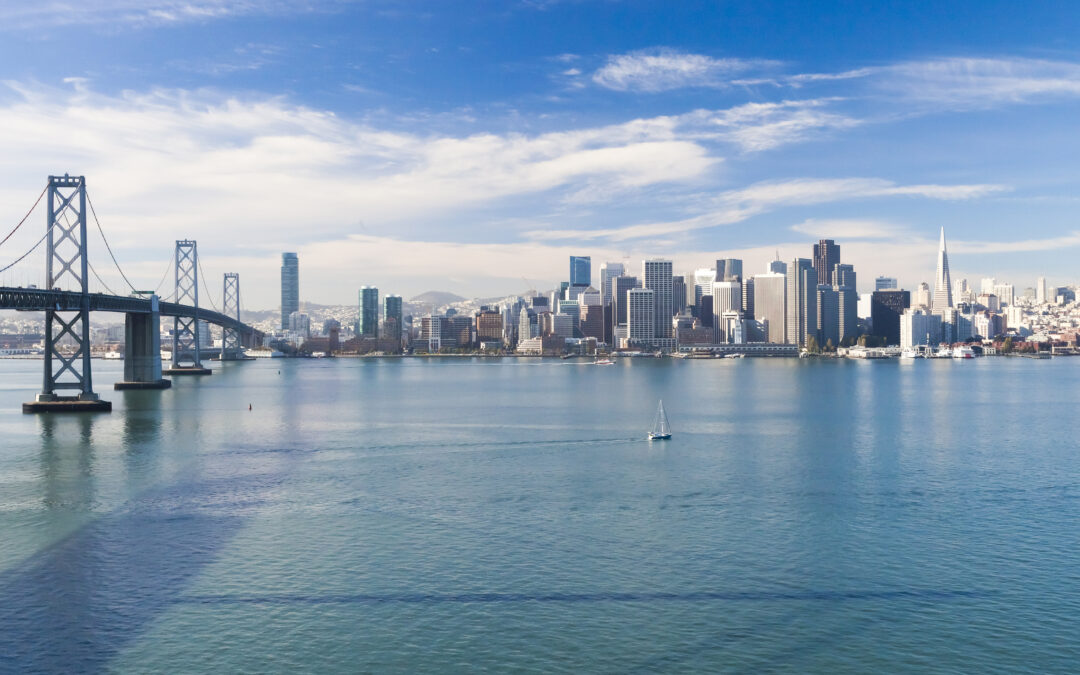The pandemic’s effects on travel left San Francisco hotel owners and operators with a massive pile of debt, but modest improvements in tourism and the convention center business have encouraged hotel owners and operators in recent months.
The CMBS delinquency rate in San Francisco’s lodging sector soared to 41.6% in June. Last June, the rate was only 5.7%, making the annual jump the largest increase in the country among the 25 biggest metros, according to Trepp data.
Despite the surge in debt, panelists at Bisnow’s Bay Area Hospitality, Retail and Restaurants Conference said domestic and international travelers are returning to San Francisco, and the city’s convention center business is slowly coming back.
“There’s been some good news lately,” David Kuperberg, head of development for Dream Hotels, the luxury boutique hotel division of Hyatt, said at the Sept. 11 conference at the Hotel Kabuki in San Francisco.
“We’re seeing a lot of international travelers come back. At the Hyatt here, we’re back to 90% of our international guests, and we’re also seeing corporate coming back,” he said, citing a return to travel for Meta and Google employees.
Salesforce’s Dreamforce conference returned to San Francisco this week. More than 45,000 people are expected to attend this year’s event, which will generate an estimated $93M for the city, according to San Francisco’s ABC affiliate.
Late last year, Salesforce CEO Marc Benioff threatened to move the convention to another city unless San Francisco officials cleaned up the area and addressed crime.
The company went ahead with its conference, and Benioff was quoted this week saying he’d likely bring the conference back again next year “if all goes well.”
“San Francisco is extremely resilient,” Oxford Hotels & Resorts partner Sar Peruri said. “The sector went through the dot-com bubble, went through [the Global Financial Crisis] and always came roaring back, and we don’t think this recovery is any different, although the cadence might be different.”
Right now, San Francisco’s hospitality sector recovery sounds more like a purr, not a roar.
Today, revenue per available room for hotels is 28% below peak 2019 levels, “so there’s still some way to go,” Kuperberg said.
Marcus & Millichap expects RevPAR and occupancy rates to increase by year’s end. The brokerage firm predicts RevPAR will reach nearly $169, while occupancy will climb to 70%, which would still be 12% below 2019 levels.
Oxford Hotels & Resorts is banking on this positive momentum, as it owns nine hotels in the region, seven of which are in San Francisco. Three Oxford hotels are in SoMa, a submarket that has dealt with high crime and office vacancy rates since the pandemic.
Peruri said there has been a groundswell of energy in the city and a decline in criminal activity on the streets, which has helped boost occupancy rates.
“If you look at a year ago versus today, it’s completely night and day,” Peruri said. “That was a function of our team, the city, state and federal agencies all working together.
“Nancy Pelosi has an office across the street from one of our hotels, and she’s working with us. We cleaned up and cleaned out that corner,” he said of Seventh Street between Mission and Market streets.
“There’s visible improvement, and it’s going to continue.”
The sky-high cost of development has made ground-up hotel development nearly impossible in San Francisco. Instead, owners are pursuing sustainable and high-tech renovations that maximize space.
Many large chains have sustainability goals to reduce their overall environmental footprint across their portfolios. Others are using technology to replace front-desk attendants, open window shades and more.
The Fed’s decision to cut interest rates by half a point on Wednesday, reducing the base rate to 4.75% to 5%, will bring development and land costs down for hotel investors, but a full resurgence of capital markets activity is likely to require more cutting.
In the meantime, Oxford is underwriting San Francisco RevPAR in five years to be approximately the same as it was in 2019, Peruri said.
Oxford and other investors have a difficult time achieving solid risk-adjusted returns in the current economy.
“If you’re investing in hospitality in San Francisco right now, you need to have a lot of runway to allow your assets to stabilize,” Peruri said. “It’s not going to look like it did before.”
He pointed to the frothy prepandemic days of high RevPAR and average daily rates.
After all three panels ended, none of the conference attendees mentioned the elephant in the room: San Francisco’s looming lodging debt issue.
Instead, they were upbeat about the future of the hospitality sector.
“2025 is looking better, with the convention business slated to improve,” Kuperberg said.
Contact Stacey Corso at stacey.corso@bisnow.com

